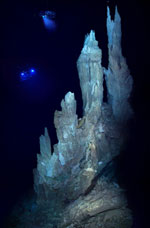Advertisement
Grab your lab coat. Let's get started
Welcome!
Welcome!
Create an account below to get 6 C&EN articles per month, receive newsletters and more - all free.
It seems this is your first time logging in online. Please enter the following information to continue.
As an ACS member you automatically get access to this site. All we need is few more details to create your reading experience.
Not you? Sign in with a different account.
Not you? Sign in with a different account.
ERROR 1
ERROR 1
ERROR 2
ERROR 2
ERROR 2
ERROR 2
ERROR 2
Password and Confirm password must match.
If you have an ACS member number, please enter it here so we can link this account to your membership. (optional)
ERROR 2
ACS values your privacy. By submitting your information, you are gaining access to C&EN and subscribing to our weekly newsletter. We use the information you provide to make your reading experience better, and we will never sell your data to third party members.
Environment
Abiogenic Hydrocarbons Born Under The Sea
February 4, 2008
| A version of this story appeared in
Volume 86, Issue 5

Low-molecular-weight hydrocarbons found in fluid that gushes from undersea hydrothermal vents are thought to have abiogenic origins, but that idea has been hard to confirm. Now, a research team led by Giora Proskurowski of the University of Washington and Woods Hole Oceanographic Institution (WHOI) presents several lines of evidence to support the theory (Science 2008, 319, 604). The researchers believe that the hydrocarbons are produced via Fischer-Tropsch reactions from inorganic carbon under high-temperature and high-pH conditions, and not from the breakdown of organic matter like hydrocarbons in fossil fuels. The team studied volatile hydrocarbons plucked from vents in the Lost City Hydrothermal Field in the Atlantic Ocean. The evidence includes the finding that the mix contains mostly short-chain alkanes and ethene and that the hydrocarbons contain less 13C with increasing chain length. "Abiogenic hydrocarbons may represent an important source of carbon and energy for microbes that inhabit vent environments as well as a source of organic precursors from which life evolved on early Earth," says Jeffrey S. Seewald, a WHOI scientist and study coauthor.


Join the conversation
Contact the reporter
Submit a Letter to the Editor for publication
Engage with us on Twitter